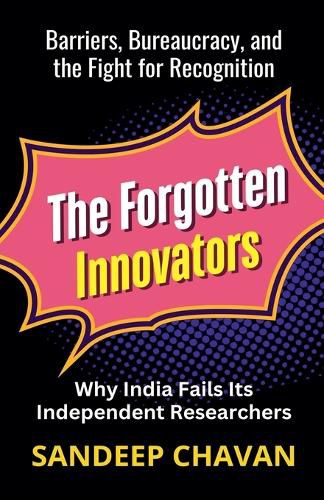Readings Newsletter
Become a Readings Member to make your shopping experience even easier.
Sign in or sign up for free!
You’re not far away from qualifying for FREE standard shipping within Australia
You’ve qualified for FREE standard shipping within Australia
The cart is loading…






India has no shortage of brilliant minds, yet its scientific research ecosystem remains heavily biased toward institutional affiliations, leaving independent researchers struggling for recognition, funding, and access to essential infrastructure. The Forgotten Innovators: Why India Fails Its Independent Researchers is a hard-hitting critique of India's research policies, funding monopolies, and bureaucratic hurdles, revealing why the country continues to fall behind in nurturing homegrown scientific breakthroughs.
In this book, Sandeep Chavan-an independent researcher himself-examines the systemic challenges that prevent non-affiliated scientists from thriving. He exposes the institutional monopoly on research grants, the bias in academic publishing, and how bureaucratic red tape discourages innovation. Through real-world case studies, data-driven insights, and global comparisons, the book highlights how countries like the U.S., Germany, and China successfully support independent researchers, offering a roadmap for reforming India's rigid system.
Key Themes of the Book:
The Institutional Monopoly on Research Funding - How government policies favor universities, IITs, and government-backed labs while excluding independent thinkers.
The Bureaucratic Maze - Why research grant applications are inaccessible to those outside academic institutions. Industry's Neglect of R&D - How India's corporate sector prioritizes short-term profits over funding high-risk, high-reward innovation. The Publishing Crisis - Why independent researchers face rejection due to the lack of institutional backing and how predatory journals exploit them. The Talent Drain - How India loses its best minds to foreign universities and research institutions. Global Best Practices - Case studies of funding models that empower non-affiliated scientists and how India can replicate them. Policy and Industry Solutions - Proposals for direct funding mechanisms, open-access labs, and private sector involvement to create a thriving research environment.
This book is not just a critique but a call to action for policymakers, industry leaders, and researchers to break the institutional barriers that stifle independent innovation. It argues that if India aspires to be a global leader in science and technology, it must create an ecosystem that supports and funds researchers regardless of their institutional ties.
Insightful, thought-provoking, and solution-oriented, The Forgotten Innovators is a must-read for anyone invested in India's scientific future-whether you're a researcher, policymaker, or advocate for independent thinking.
$9.00 standard shipping within Australia
FREE standard shipping within Australia for orders over $100.00
Express & International shipping calculated at checkout
India has no shortage of brilliant minds, yet its scientific research ecosystem remains heavily biased toward institutional affiliations, leaving independent researchers struggling for recognition, funding, and access to essential infrastructure. The Forgotten Innovators: Why India Fails Its Independent Researchers is a hard-hitting critique of India's research policies, funding monopolies, and bureaucratic hurdles, revealing why the country continues to fall behind in nurturing homegrown scientific breakthroughs.
In this book, Sandeep Chavan-an independent researcher himself-examines the systemic challenges that prevent non-affiliated scientists from thriving. He exposes the institutional monopoly on research grants, the bias in academic publishing, and how bureaucratic red tape discourages innovation. Through real-world case studies, data-driven insights, and global comparisons, the book highlights how countries like the U.S., Germany, and China successfully support independent researchers, offering a roadmap for reforming India's rigid system.
Key Themes of the Book:
The Institutional Monopoly on Research Funding - How government policies favor universities, IITs, and government-backed labs while excluding independent thinkers.
The Bureaucratic Maze - Why research grant applications are inaccessible to those outside academic institutions. Industry's Neglect of R&D - How India's corporate sector prioritizes short-term profits over funding high-risk, high-reward innovation. The Publishing Crisis - Why independent researchers face rejection due to the lack of institutional backing and how predatory journals exploit them. The Talent Drain - How India loses its best minds to foreign universities and research institutions. Global Best Practices - Case studies of funding models that empower non-affiliated scientists and how India can replicate them. Policy and Industry Solutions - Proposals for direct funding mechanisms, open-access labs, and private sector involvement to create a thriving research environment.
This book is not just a critique but a call to action for policymakers, industry leaders, and researchers to break the institutional barriers that stifle independent innovation. It argues that if India aspires to be a global leader in science and technology, it must create an ecosystem that supports and funds researchers regardless of their institutional ties.
Insightful, thought-provoking, and solution-oriented, The Forgotten Innovators is a must-read for anyone invested in India's scientific future-whether you're a researcher, policymaker, or advocate for independent thinking.